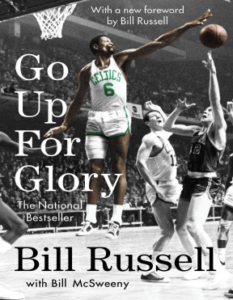Go up for Glory is the first Bill Russell book that I’m writing about in this blog. It is more or less a typical autobiography. What’s special is that Russell did not write the book at the end of his life or at least after his career. It was first published in 1966 and as Bill Russell ended his career in 1969, he was still active when he wrote this book.

Go up for Glory shows Russell’s winner mentality on and off the court
In the article on Drive by Larry Bird, I criticized the book a little bit for not being controversial. That is different here. Russell was a somewhat controversial person (at that time) and openly expressed his opinion on many topics. He himself writes about this attitude in Go up for Glory (this was about his college days):
If all this sounds like sour grapes, let me say that I have grown tired of sports biographies in which everyone is a do-gooder and everything is sugar and spice. It wasn’t for me. It wasn’t for a lot of others and writing is just like playing the game. Either you tell the truth as you see it, just as you play your guts out, or you shouldn’t be in it.
Another quote that reflects his attitude well is the following:
I will not lie for a simple reason—I think too much of myself. You ask me for my opinion and you will get it. The trouble with asking someone’s opinion is that most people who ask your opinion don’t really want it. They just want their own opinion confirmed.
Typical autobiography beginning with childhood
Born in Louisiana in 1934, Russell begins with his childhood, although he doesn’t dwell on any one topic for very long. The individual chapters are relatively short and you can easily read the book in a few days. His childhood was primarily shaped by the segregation that still prevailed in the south of the USA at the time.
Bill Russell repeatedly returns to this topic and the civil rights movement, which was very strong when the book was published. He makes it clear that he was rather disappointed by the development of this movement. He also describes how difficult he had it at the beginning in the NBA and in Boston as a black man, without ever wanting to arouse sympathy for himself.
As far as the NBA part is concerned, he goes into the inner workings of the Celtics in Go up for Glory. Bill Russell won 9 titles in 11 years with the team. He describes how he had a respectful relationship with Bob Cousy, but a rather distant one off the court. He also describes the player/voach relationship with the legendary Red Auerbach very impressively. You can tell that the two men had a great respect for each other. Russell also describes the way in which Auerbach tried to motivate the team, his outbursts during the game and how he put opponents under pressure.
He also discusses his relationship with Wilt Chamberlain, although there is little controversy here. Above all, these two players also shared a mutual respect. Russell writes in this book, among other things:
He won his awards. I won mine. To me, the great awards were the championships.
Old Bill Russell book with new afterword
This sentence could certainly be interpreted as a little tease, as Wilt was primarily known for his individual performances, while Russell was known for the titles and rings. Bill Simmons probably liked this sentence. He devotes an entire chapter to the rivalry between Chamberlain and Russell in his book The Book of Basketball and leaves no doubt that he favors the Celtics player.
The foreword and afterword in my edition are new and must have been written relatively shortly before Bill Russell’s death in the summer of 2022. In the epilogue, he mentions that the NBA has lost David Stern and Kobe Bryant. Both died in January 2020.
Overall, as I said, you can read through this Bill Russell book quite quickly and smoothly. But that’s not to say it’s light reading. Russell didn’t mince his words in this book and told things he felt that he need to tell. He didn’t just make friends at the time. He definitely lived up to his self-imposed claim You ask me for my opinion and you will get it.
Get at AmazonThe button above is an affiliate link. If you order a book via this link, I will receive a small percentage of the purchase price as a commission. There are no additional costs for you.

